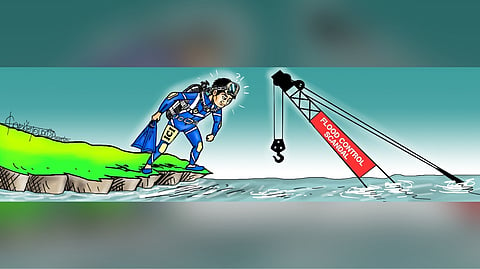
- NEWS
- the EDIT
- COMMENTARY
- BUSINESS
- LIFE
- SHOW
- ACTION
- GLOBAL GOALS
- SNAPS
- DYARYO TIRADA
- MORE

The Independent Commission on Infrastructure (ICI) must get to the bottom of the flood control scandal and uncover the masterminds of the racket and the scheme that led to it, starting from the mangling of the annual budget.
By doing this, it will serve a function that transcends those of the congressional hearings on the issue that are believed to be biased in the way interests and members of the two chambers are protected.
Since August 2025, both chambers of Congress have launched probes — the Senate Blue Ribbon Committee’s Philippines Under Water inquiry and the House infrastructure committee’s hearings — but the process was perceived as ineffective due to self-protective dynamics within the legislative branches, in which blame is tossed to the opposite chamber while peers are protected.
With House members and senators implicated, the inquiries were, at best, theatrics rather than punitive. Likewise, intra-house finger-pointing and lately, a conspiracy to protect certain high figures raise doubts about impartiality.
The ICI, a three-member ad hoc commission appointed by President Ferdinand Marcos Jr., enjoys broad powers to investigate not just flood control but all infrastructure contracts, which will include the budget perversion that enabled the scam.
The composition of the body, thus far, lives up to its billing of its members having “proven competence, integrity, probity and independence.”
It will have the capability to get to the root of the outrage through its motu proprio probes into officials, employees, and individuals involved in anomalies, with subpoena powers to summon witnesses and gather evidence.
It can trace the scheme starting from the budget insertions and can recommend criminal, civil, and administrative cases, bypassing legislative biases.
Beyond punishment, the ICI was also tasked to propose systemic changes, such as enhanced transparency in budgeting and blacklisting fraudulent contractors.
The halting of 2026 flood funding and the suspension of bids was a step demonstrating determination to end the blight on public funds, and the ICI’s independence ensures that the reforms will be followed through.
Congressional hearings must be credited for amplifying public awareness and extracting key testimonies, but the inherent biases of the legislators, stemming from self-preservation among implicated members, limit their effectiveness in dismantling the racket.
Testimonies unveiled a scheme where contractors paid 25 percent kickbacks to secure contracts, leaving just 30 to 40 percent of funds for actual construction.
At least 17 House members who allegedly demanded payoffs were revealed in the House hearing, while former DPWH engineer Brice Ericson Hernandez implicated Senators Jinggoy Estrada and Joel Villanueva.
It was also revealed through the determination of budget watchdogs in both chambers that during the bicameral conference committee process for the 2025 General Appropriations Act (GAA), an estimated P142 billion in unvetted “insertions” were made.
In Bulacan, a hotspot for anomalies, P12.08 billion was inserted, including nearly P3 billion specifically for flood projects.
The mangling also resulted in the diversion of Overseas Development Assistance funds; for instance, P40.2 billion out of P49.1 billion in ODA for flood control in 2024-2025 was reallocated.
Former DPWH chief Manuel Bonoan’s family ties to a certain contractor laid bare a network of corruption involving politicians, bureaucrats, and schemers exploiting the budget process for personal gain.
The ICI, operating outside these chambers, can transcend this by conducting a thorough, unbiased excavation of the budget mangling that birthed the scheme, holding “no sacred cows,” as President Marcos has vowed.
ICI’s success will hinge on the unyielding pursuit of the masterminds, from congressional inserters to DPWH enablers.
